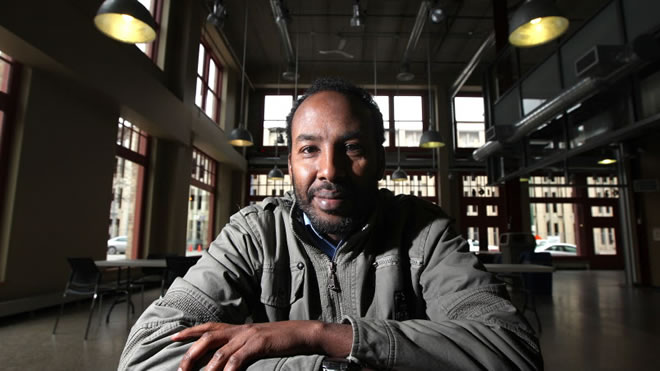Immigrants, agencies fear government retribution

By Carol Sanders
Saturday, May 23, 2015

PHIL HOSSACK / WINNIPEG FREE PRESS FILES - Abdikheir Ahmed says Somali community members in Winnipeg have been harassed by CSIS agents on the hunt for radicals
People afraid to sign petitions. Advocates for the vulnerable censoring themselves. Non-profit organizations muzzled by the fear of retribution. Government spies intimidating activists.
It's not communist China or North Korea where this climate of fear exists -- it's here in Canada, said participants at a Canadian Council for Refugees meeting in Winnipeg Friday.
"It takes me back to 1980s Somalia," said Abdikheir Ahmed, a leader in Winnipeg's Somali community. He was a panellist at a session called Beating the Chill, about dealing with the fear and uncertainty enveloping newcomer communities in Canada these days.
The "chill," they say, follows drastic cuts and changes to Canada's immigration policy, a ratcheting up of Islamaphobia and mistrust of refugees and silencing voices of dissent.
"There's so much fear," said Ahmed. Employees of agencies that work with newcomers censor themselves for fear of falling out of favour with the government and losing funding, said Ahmed. It reminds him of Somalia in the 1980s before its civil war and Egypt more recently, where criticizing the government comes with risk.
Ahmed talked about Somali community members in Winnipeg "harassed" by Canadian Security Intelligence Service agents on the hunt for radicals. He got his first call in 2010 from a CSIS agent who invited him for coffee but didn't trust him enough to say what she wanted to discuss. Not trusting the agent, he said he'd meet her if he could bring a lawyer. He never heard back from her. Three years later, he got a call from a different CSIS agent with the same invitation.
"If it's intimidating for me, someone who's educated and knows the language, imagine what it's like for a refugee who's just arrived?" he said in an interview after the discussion at the Radisson Hotel downtown.
There are so many organizations now that want to "keep their heads down," said Janet Dench, executive director of the Canadian Council for Refugees. The non-profit umbrella group committed to the rights and protection of refugees is made up of organizations involved in the settlement, sponsorship and protection of refugees and immigrants.
Charities afraid of losing their charitable status for political activity and non-government organizations afraid of losing their government funding are staying mum rather than questioning government policy and advocating for vulnerable people who don't have a voice, the panel discussion heard.
The chill is happening across the country. Amy Casipullai with the Ontario Council of Agencies Serving Immigrants in Toronto knows people working for non-profits are "dialing back" their activism for fear of retribution. She recalled the case of one community worker who stepped away from organizing a Women's Day march because she was afraid it would interfere with her application for permanent resident status in Canada.
Since she arrived in Canada in 1985, Casipullai has seen different governments from different parties try to quiet their critics, but this time it's different.
"It's more blatant. The chill is more prevalent, more blunt and in your face," she said. CSIS agents are trying to get as much information as possible and "cast a wide net," she said.
Ahmed said he frequently hears from members of the mainly Muslim Somali community in a panic over getting a call from CSIS, and wondering why they've been singled out. They start to wonder if they're ever going to be considered truly Canadian, he said.
The council for refugees has come out against Islamaphobia, said Dench. In a statement issued earlier, it said Canadians' disproportionate focus on the head coverings worn by some Muslim women is distracting the public from a real problem -- discrimination against Muslims in the Canadian labour market.
"At a time when Canadians are concerned about potential radicalization of youth, stereotyping Muslims is dangerously counterproductive, since it can make Muslim youth question whether they can ever fully belong in Canadian society," it said.
carol.sanders@freepress.mb.ca